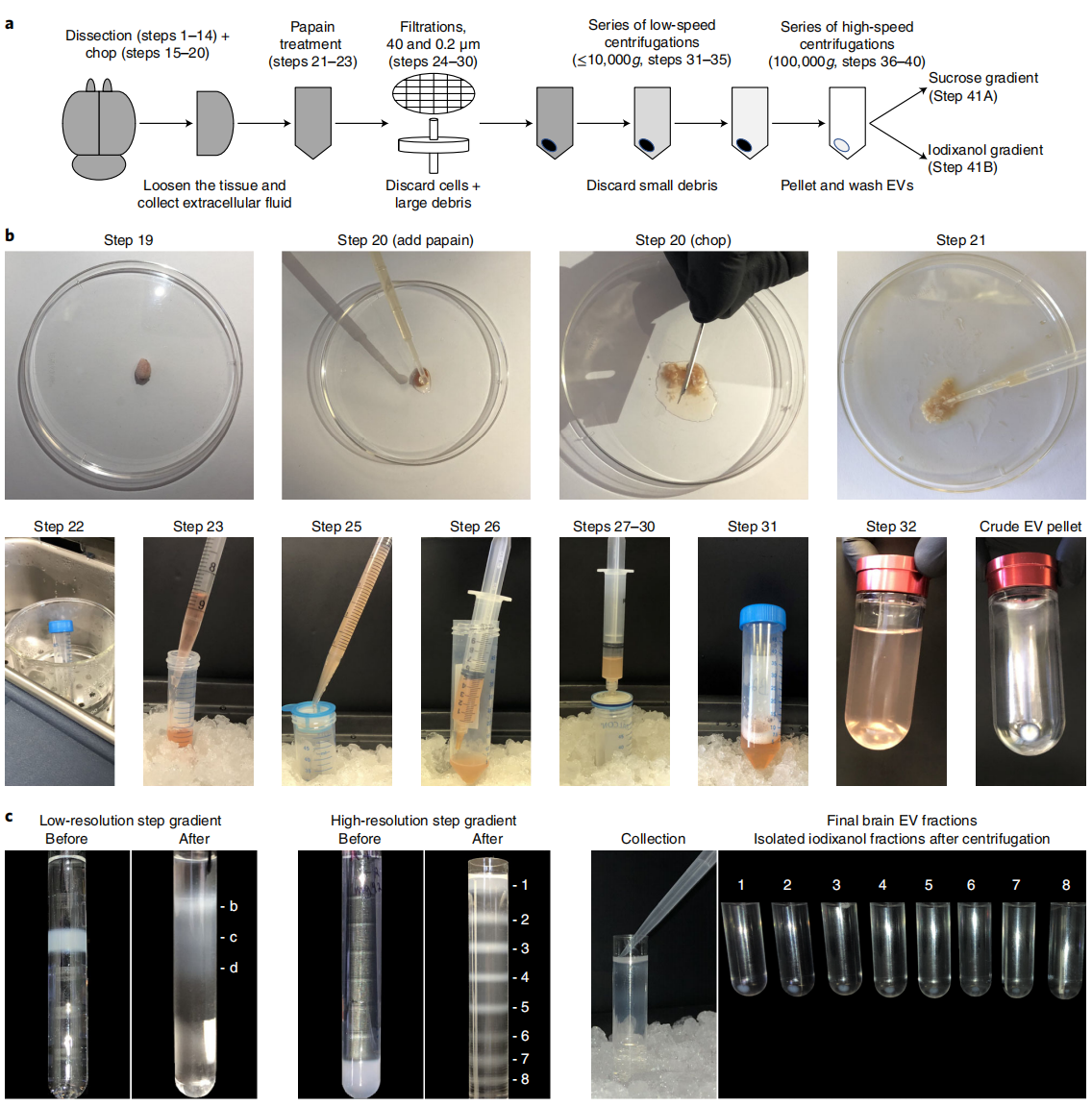Brain Tissue Exosome Research and Application
Brain tissue-derived exosomes are nanoscale vesicles secreted by various cell types within the central nervous system, including neurons, astrocytes, and oligodendrocytes. These exosomes reside in the interstitial microenvironment of brain tissue and carry a wide range of bioactive molecules such as proteins, lipids, and RNAs. They are actively involved in neurodevelopment, synaptic plasticity, inflammation regulation, apoptosis, and the propagation of pathological signals. Compared to exosomes derived from body fluids or cell cultures, brain tissue-derived exosomes exhibit enhanced specificity to lesion regions, offering distinct advantages in the early diagnosis, mechanistic understanding, and therapeutic targeting of neurological disorders, brain tumors, and traumatic brain injuries.
MtoZ Biolabs has accumulated extensive experience in exosome research. Leveraging advanced exosome isolation platforms and a robust multi-omics analysis system, we offer fully customized solutions that cover the entire workflow of Brain Tissue Exosome Research and Application—empowering researchers to uncover the biological roles of these vesicles in both healthy and diseased states.
Analysis Workflow
To address the complexity and high heterogeneity of brain tissue exosomes, MtoZ Biolabs has established a scientifically validated and highly efficient workflow that ensures sample purity, molecular integrity, and reproducible results.
1. Brain Tissue Sample Preparation
Mechanical homogenization, tissue sectioning, or in situ enzymatic digestion is employed to release interstitial exosomes while eliminating cell debris and contaminants.
2. Exosome Isolation and Purification
A multi-step process combining differential ultracentrifugation, density gradient centrifugation, and membrane filtration is used to obtain high-purity brain-derived exosomes.
3. Physicochemical Characterization
Nanoparticle tracking analysis (NTA) is used to determine particle size and concentration; transmission electron microscopy (TEM) to visualize vesicle morphology; and Western blotting to confirm marker proteins such as CD63, CD81, and TSG101.
4. Multi-omics Profiling
Comprehensive molecular profiling is conducted, including proteomics, transcriptomics (miRNA/lncRNA), lipidomics, and metabolomics, to deeply characterize exosomal content.
5. Bioinformatics Analysis and Functional Prediction
Differential expression analysis, pathway enrichment, and regulatory network construction are applied to elucidate functional mechanisms and disease associations.
Why Choose MtoZ Biolabs?
With a strong foundation in exosome technologies and a customer-centric approach, MtoZ Biolabs delivers high-quality, end-to-end support for Brain Tissue Exosome Research and Application. Our key strengths include:
✅ Neural Tissue-specific Optimization: Tailored processing protocols preserve exosome integrity and minimize interference from mixed neuronal and glial components.
✅ High-purity Isolation System: Stepwise purification effectively removes degraded tissue byproducts, enhancing sample quality for downstream analyses.
✅ High-throughput Omics Platforms: Equipped with Orbitrap mass spectrometry and Illumina sequencing technologies, we support in-depth molecular exploration of brain-derived exosomes.
✅ Expert Technical Support and Data Interpretation: From experimental design to bioinformatics analysis, we provide full-spectrum consulting to accelerate impactful discoveries and support publications or funding proposals.
✅ One-Time-Charge: Our pricing is transparent, no hidden fees or additional costs.
Applications
Brain Tissue Exosome Research and Application has unlocked new frontiers in both basic and translational neuroscience. Key application areas include:
· Mechanistic Studies in Neurodegenerative Diseases
Investigating how exosomes mediate pathological protein transmission and neuronal damage in conditions such as Alzheimer’s and Parkinson’s disease.
· Tumor Microenvironment Profiling
Characterizing exosomal components from glioma tissues that contribute to tumor progression and immune evasion.
· Research on Brain Injury and Repair
Analyzing post-injury changes in exosome composition to evaluate their regulatory roles in neuroinflammation and tissue regeneration.
· Biomarker Discovery for Brain Disorders
Identifying highly stable and specific exosomal miRNAs, proteins, or metabolites that serve as potential biomarkers for early screening and prognosis.
Case Study
Case 1: High-Resolution Subtype Isolation of Brain-Derived Exosomes Enhances Neurological Disease Research
A study developed a high-resolution exosome separation protocol tailored for both mouse and human brain tissues. Using iodixanol density gradient centrifugation, researchers successfully isolated various exosome subtypes, including mitovesicles. This was validated through NTA, TEM, and immunoblotting, enabling systematic characterization of brain-derived vesicles. These findings provided strong support for investigating the role of exosomes in neurodegenerative disease mechanisms.

D'Acunzo, P. et al. Nat. Protoc. 2022.
MtoZ Biolabs provides services related to Brain Tissue Exosome Research and Application and facilitates its advanced application in disease research and mechanistic exploration.
FAQ
Q1: Are brain tissue exosomes difficult to extract?
A1: Yes. The dense structure and cellular complexity of brain tissue pose significant challenges for conventional isolation methods. MtoZ Biolabs employs optimized protocols—combining in situ enzymatic digestion, ultracentrifugation, and density gradients—to efficiently extract high-purity, structurally intact exosomes with defined origins.
Q2: Can neuron-related miRNAs be detected in brain exosomes?
A2: Absolutely. We offer miRNA sequencing services for brain-derived exosomes and provide comprehensive expression profiling and functional analysis of miRNAs involved in neurodevelopment, synaptic function, and inflammation.
Q3: Is integrated analysis of proteomics and miRNA profiling available?
A3: Yes. MtoZ Biolabs supports simultaneous proteomic and miRNA profiling from the same exosome sample. Integrated bioinformatics analysis enables the discovery of regulatory pathways and potential molecular mechanisms.
Brain Tissue Exosome Research and Application offers a powerful framework for decoding the complex molecular landscape of the central nervous system. MtoZ Biolabs will continue to advance this field through innovation, precision, and scientific rigor—delivering integrated, high-quality technical services to support breakthroughs in neuroscience research and the precision diagnosis and treatment of brain diseases.
How to order?







